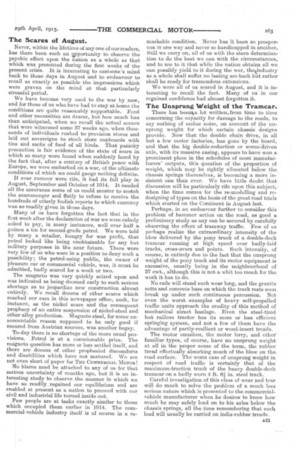The Scares of August.
Page 3

If you've noticed an error in this article please click here to report it so we can fix it.
Never, within the lifetime of any one of our readers, has there been such an. qpportunity to observe the psychic effect upon the ration as a. whole as that which was presented during the first weeks of the present crisis, it is interesting to casteene's mind. back to those days in August and to endeavour to recall as exactly as possible the impressions which were graven on the mind at that particularly stressful period.
We have become very used to the war by now, and for those of us who have had to stay at. home the conditions are quite reasonably supportable. Food and other necessities are dearer, but how much less than anticipated, when we recall the actual scenes that were witnessed some 37 weeks ago, when thousands of individuals rushed to provision stores and laid out sovereigns to stock store cupboards with tins and sacks of food of all kinds. That panicky precaution is fair evidence of the state of scare in which so many were found when suddenly faced by the fact that, after a century of British peace with Europe, we were embarked on a, war, of the ultimate conditions of which we could gauge nothing definite.
If ever rumour were rife, it had its full play in August, September and October of 1914. it. needed all the assurance some of us could muster to scotch the scaremonger and flatly to refuse to receive the hundreds of utterly foolish reports to which currency was so readily given in those days.
Many of us have forgotten the fact that in the first week after the declaration of war we were calmly asked to pay, in many instances, well over half a guinea a tin for second-grade petrol. We were told by many a retailer, hungry for war profit, that petrol looked like beinc, unobtainable for any but military purposes in the near future. There were very few of us who were in a position to deny such a possibility; the petrol-using public, the owner of pleasure car or commercial vehicle, was, it must be admitted, badly scared for a week or two.
The magneto was very quickly seized upon and was indicated as being doomed early to such serious shortage as to jeopardize new construction almost entirely. We recall dozens of other scares which reached our ears in this newspaper office, such, for instance, as the nickel scare and the consequent prophecy of an entire suspension of nickel-steel and other alloy production. Magneto steel, for some unaccountable reason supposed to be only good if secured from Austrian sources, was another bogey.
To-day there is no shortage of the more usual provisions. Petrol is at a conscionable price. The magneto question has more or less settled itself, and there are dozens of other prophesied discomforts and disabilities which have not matured. We are not even short of paper for THE COMMERCIAL MOTOR!
No blame need be attached to any of us for that serious uncertainty of months ago, but it is an interesting study to observe the manner in which we have so readily, regained our equilibrium and are enabled at present as a nation to proceed with our civil and industrial life turned inside out.
Few people are at tasks exactly similar to those which occupied them earlier in 1914. The commercial-vehicle industry itself is of course in a re markable condition. Never has it been so prosperous in one way and never so handicapped in another. Still we carry an, all of us with the stern determination to do the beet we can with the circumstances, and to see to it that while the nation obtains all we can possibly yield to it during the war, thetindustry as a whole shall suffer no lasting set-back but rather shall be ready for tremendous extensions. We were all of us scared in August, and it is interesting to recall the fact. Many of us in our regained confidence had almost forgotten it.






















